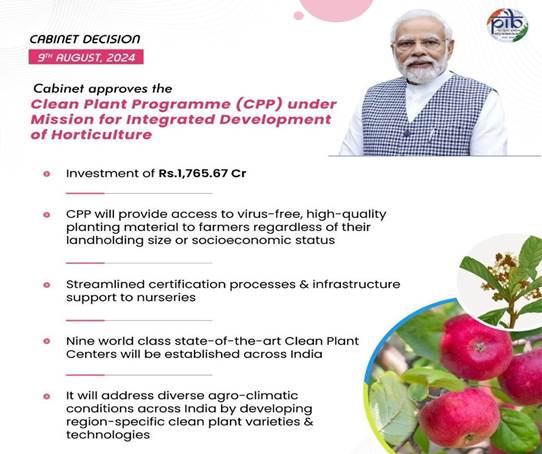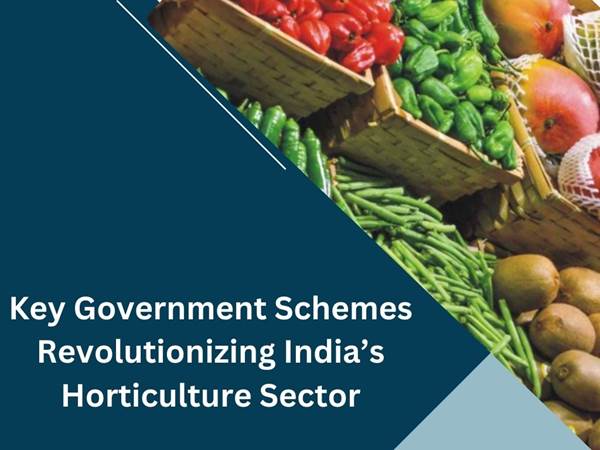Others
Clean Plant Programme: A Major Leap Forward in Horticulture Sector
Transforming Horticulture with CPP
Posted On:
11 AUG 2024 2:08PM
In a transformative move for India’s horticulture sector, the Union Cabinet, led by Prime Minister Shri Narendra Modi, has approved the Clean Plant Programme (CPP). Supported by a substantial investment of Rs. 1,765.67 crore and spearheaded by the Ministry of Agriculture and Farmers Welfare, the CPP aims to enhance the quality and productivity of fruit crops across the country. This initiative will set new benchmarks for excellence and sustainability in agriculture.

Leveraging India's diverse climate, which supports the cultivation of a wide array of fresh fruits and vegetables, the country stands as the world’s second-largest producer in this sector, trailing only China.
What is the Clean Plant Programme (CPP)
CPP is designed to address critical issues in horticulture by providing access to high-quality, virus-free planting material. The programme is poised to deliver numerous benefits across various stakeholders, from farmers to consumers, and bolster India's position in the global fruit market.
Key Benefits of the Clean Plant Programme (CPP)
- Farmers
Increased Crop Yields: By providing virus-free, superior planting material, the CPP aims to boost crop yields.
Enhanced Income Opportunities: Higher quality produce will lead to better market prices and income for farmers.
- Nurseries
Propagation: Streamlined certification processes and infrastructure support will help nurseries in efficiently producing clean planting material.
Sustainability: Improved facilities will foster growth and sustainability in the nursery sector.
- Consumers
Superior Produce: The initiative ensures that consumers receive fruits that are not only virus-free but also enhanced in taste, appearance, and nutritional value.
- Exports
Global Market Strengthening: With higher-quality, disease-free fruits, India will enhance its position as a leading global exporter, thereby expanding market opportunities and increasing its share in the international fruit trade.
Core Components of the CPP
Clean Plant Centers (CPCs)
- State-of-the-Art Facilities: Nine advanced CPCs will be established across India, each focusing on specific fruit types. These centers will be equipped with modern diagnostic and therapeutic facilities, including tissue culture labs.
- The centers are:
- Grapes: NRC, Pune
- Temperate Fruits (Apple, Almond, Walnuts, etc.): CITH, Srinagar & Mukteshwar
- Citrus Fruits: CCRI, Nagpur & CIAH, Bikaner
- Mango/Guava/Avocado: IIHR, Bengaluru
- Mango/Guava/Litchi: CISH, Lucknow
- Pomegranate: NRC, Sholapur
- Tropical/Sub-Tropical Fruits in Eastern India
Certification and Legal Framework
- Regulatory Measures
A robust certification system will be implemented under the Seeds Act of 1966, ensuring accountability and traceability in the production and sale of planting material.
- Enhanced Infrastructure
Large-scale nurseries will receive support for developing infrastructure to facilitate the efficient multiplication of clean planting material.
Integration with Mission for Integrated Development of Horticulture
The CPP complements the ongoing Mission for Integrated Development of Horticulture (MIDH), a Centrally Sponsored Scheme initiated in 2014-15 aimed at the holistic growth of the horticulture sector. MIDH covers a wide range of crops including fruits, vegetables, root and tuber crops, mushrooms, spices, flowers, aromatic plants, coconut, cashew, bamboo, and cocoa.
Under MIDH, several key measures are being undertaken
- Plantation Infrastructure Development: Establishing nurseries and tissue culture units to produce quality seed and planting material.
- Area Expansion: Creating new orchards and gardens for various crops, with or without integration (e.g., drip irrigation).
- Rejuvenation: Revitalizing old, unproductive orchards.
- Protected Cultivation: Setting up poly-houses, greenhouses, shade net houses, and walk-in tunnels, along with micro irrigation facilities.
- Promotion of Organic Farming: Encouraging organic practices, certification, and establishing vermi compost units.
- Creation of Water Resources: Developing community tanks, on-farm ponds, and water harvesting systems.
- Pollination Support through Beekeeping: Producing bee colonies, honey bee hives, and related equipment.
- Horticulture Mechanization: Providing power tillers, tractors, and plant protection equipment.
- Human Resource Development: Conducting awareness programs, farmer training, exposure visits, and study tours.
- Post-Harvest Management (PHM) Infrastructure: Setting up cold storage, pack houses, ripening chambers, reefer vehicles, processing units, and food processing facilities in North Eastern States.
- Marketing Infrastructure: Developing static and mobile vending carts, retail outlets, rural markets, wholesale markets, and direct market platforms.
Inclusion and Sustainability
The CPP places a strong emphasis on inclusivity and sustainability. It aims to provide affordable access to clean plant material for all farmers, regardless of their landholding size or socioeconomic status. The programme will also actively engage women farmers, ensuring their participation in planning, resource access, training, and decision-making processes. Additionally, the CPP will address the diverse agro-climatic conditions across India by developing region-specific clean plant varieties and technologies.
Alignment with Broader Initiatives
The Clean Plant Programme aligns with broader initiatives such as Mission LiFE (Lifestyle for Environment) and the One Health approach. By promoting sustainable practices and reducing dependence on imported planting materials, the CPP represents a crucial step towards establishing India as a global leader in fruit production and export.
Implementation and Oversight
The programme will be implemented by the National Horticulture Board in collaboration with the Indian Council of Agricultural Research (ICAR). Through this partnership, the CPP is set to drive transformative change in India's horticultural sector, marking a significant leap forward in the country’s agricultural landscape.
With its comprehensive approach and substantial investment, the Clean Plant Programme is poised to revolutionize India's horticulture sector, ensuring that farmers, consumers, and the global market benefit from high-quality, virus-free fruits.
Horticulture schemes and initiatives
India's horticulture sector, vital for both the economy and nutrition, has seen significant enhancements through various government schemes and initiatives. These programs are designed to address diverse challenges and unlock the sector's potential, focusing on improving crop quality, expanding production, and ensuring market access.

National Horticulture Mission (NHM)
Launched in 2005, the NHM is a centrally sponsored scheme aimed at promoting holistic growth of the horticulture sector. It focuses on enhancing horticulture production, improving nutritional security, and providing income support to farmers. The mission covers a wide range of horticulture crops and provides support for various activities including area expansion, rejuvenation of old orchards, protected cultivation, and post-harvest management.
Enhanced Support for Horticulture Under PMFBY
Under the PMFBY guidelines, the premium contribution for farmers is capped at 2% for Kharif crops, 1.5% for Rabi crops, and 5% for commercial and horticultural crops. This substantial support underscores the government’s commitment to protecting horticultural crops, reflecting their importance and the need for targeted insurance solutions to safeguard this vital sector.
Horticulture Cluster Development Programme (HCDP)
The HCDP is designed to leverage geographical specialization and promote integrated and market-led development of horticulture clusters. By focusing on identified crops in specific regions, it aims to optimize productivity through better utilization of resources. The program targets to increase in exports of the focus crops and seeks to improve the competitiveness of Indian horticulture products in the global market.
Post-harvest Infrastructure Development Scheme
This scheme addresses the critical issue of post-harvest losses in the horticulture sector. It provides support for establishing modern post-harvest facilities such as pack houses, ripening chambers, cold storage units, and processing facilities. By improving post-harvest management, the scheme aims to reduce wastage, extend the shelf life of produce, and ensure better returns for farmers.
Soil Health Card Scheme
While not exclusive to horticulture, this scheme significantly benefits horticultural farmers. It involves testing soil samples and providing farmers with soil health cards containing crop-wise recommendations for nutrients and fertilizers. This enables farmers to make informed decisions about soil management, potentially leading to improved crop yields and reduced input costs.
Horticulture Mission for North East and Himalayan States (HMNEH)
This mission focuses on the comprehensive development of horticulture in the North Eastern states and Himalayan regions. It takes into account the unique agro-climatic conditions of these areas and promotes crops that are particularly suited to these regions, aiming to improve farmers' livelihoods and promote sustainable horticulture practices.
Conclusion
Clean Plant Programme (CPP) stands as a transformative initiative poised to significantly elevate India's horticulture sector. By improving the quality and sustainability of fruit production and enhancing the country’s export capabilities, the CPP is set to reinforce India’s position as a global leader in the fruit trade. Furthermore, its inclusive approach, which ensures equitable access to resources and actively involves women farmers, highlights the programme’s dedication to fostering broad-based growth and development within the sector.
References
Click here to see in PDF:
Santosh Kumar/Sheetal Angral/Aparajita Priyadarshini
(Explainer ID: 152014)
आगंतुक पटल : 14543
Provide suggestions / comments